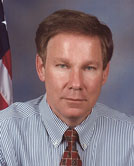| News from September 21-25, 2002 |
 He addressed
"the extraordinary administrative obstacle that would arise if such
providers were forced to collect and remit local taxes in approximately 15,000
different jurisdictions. This reality has already been recognized in reference
to satellite television, and appropriate legislative steps have been
taken." Davis stated that currently Section 602 of the Telecom Act provides
an exemption for satellite TV, but that "additional legislation is required
to include satellite radio and certain other satellite programming services that
may evolve in the future".
He addressed
"the extraordinary administrative obstacle that would arise if such
providers were forced to collect and remit local taxes in approximately 15,000
different jurisdictions. This reality has already been recognized in reference
to satellite television, and appropriate legislative steps have been
taken." Davis stated that currently Section 602 of the Telecom Act provides
an exemption for satellite TV, but that "additional legislation is required
to include satellite radio and certain other satellite programming services that
may evolve in the future".